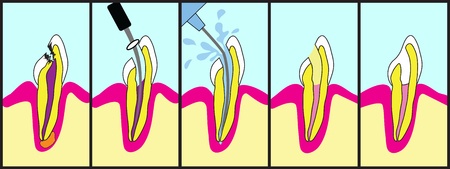
If you have never had endodontic treatment, you will have many questions about the treatment and want to know why your dentist suggested it. As a lay person, you may know this treatment as root canal. See, now it doesn’t sound so ominous, does it?
Here are some common questions about root canals that people want answers to.
1. Who performs a root canal?
All dentists learn undergo root canal training while they are at dental school. Hence, even a general dentist has the know-how and ability to perform root canal. Alternatively, you can go to an endodontist, who has undergone special training in all types of endodontic treatments and procedures.
2. What is a root canal?
To understand the procedure, you would need to know more about the tooth anatomy. The tooth comprises of the outer white coating, which is known as the enamel, and the inner hard layer, which is called the dentin. Under the dentin is soft tissue known as pulp. This part of the tooth contains a lot of nerves, blood vessels and connective tissue. The pulp reaches all the way from the crown of your tooth till the end of the roots.
So, when your dentist says he is going to do a root canal, it means treating the inside of your affected tooth.
3. Why do I need an endodontic procedure?
You would need such a procedure if the pulp of your tooth is infected or inflamed. This can occur due to deep seated decay, chipped or cracked tooth and frequent dental procedures. It is important to remember, the pulp of the tooth can get damaged by a blow even if your tooth shows no sign of chipping or cracking. When an infected or inflamed pulp is not treated, it can cause excruciating pain and result in an abscess.
4. Can an endodontic procedure save my tooth?
If the pulp of your tooth is infected or inflamed, your dentist first cleans the inside of the tooth and shapes it. Thereafter, the space is filled and sealed. The tooth is then covered with a crown to protect it and restore complete function of the tooth. You will be able to chew and bite, depending on the location of the restored tooth. So, one can say the procedure definitely can help save your tooth, as the need for extraction is not there after a root canal.
5. Is the procedure painful?
If you have an endodontic problem, you will be in severe pain. Today, most dentists use anesthetics and modern techniques, including lasers, to ensure patients are comfortable during the procedure.
You may experience some amount of pain after undergoing the procedure. This is especially true if the root of your tooth was infected or inflamed. The good news is the pain is usually bearable and disappears within a few days. In case you experience severe pain, it is best to consult your dentist to find out the reason for the pain.
6. How much will I have to pay for an endodontic procedure?
For many people cost becomes a factor when opting for a dental procedure. However, your teeth are precious and gateway to your overall health. So, do not let cost dictate oral and dental health. This said, the cost of an endodontic procedure depends on the tooth affected and the severity of the problem. Usually, molars are more difficult to treat and therefore, they tend to cost more.
If you decide to have endodontic treatment, you will realize the treatment is less expensive compared to having the affected tooth extracted. This is because once a tooth is extracted, the resultant space has to be filled with an implant or bridge to ensure the adjacent teeth do not shift and you have the ability to chew.




